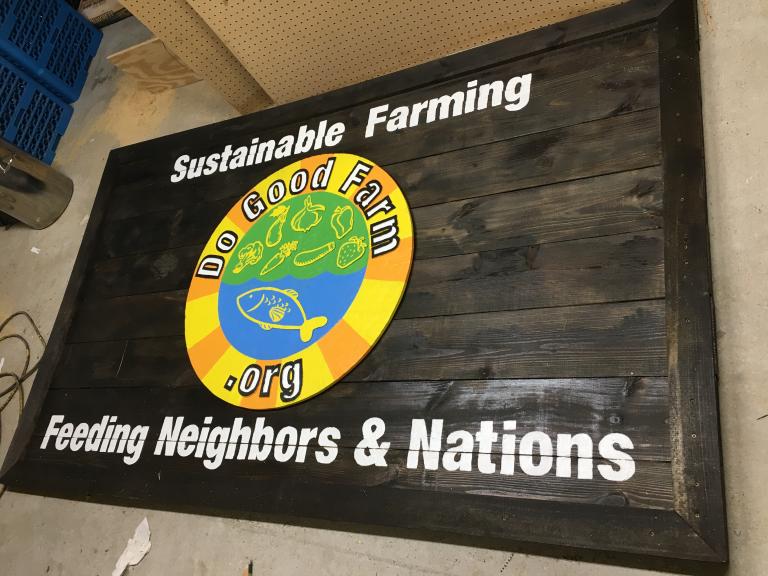The idea for Do Good Farm began in 2010, as several people began to really explore sustainable ways to affect global hunger and get beyond just shipping boxes of rice and beans over and over again to developing nations. We believe that a combination of aquaponics and permaculture soil farming is a real solution. We invite you to watch a short video that explains aquaponics on our website www.dogoodfarm.org under the video tab. We were also recently featured on the Today Show. That video is accessible there as well.
In addition, our goal is to empower missions and communities to create sustainable businesses as a way to fund themselves so that every aspect of what they do is sustainable. For example, an orphanage in Honduras could use sustainable farming, including aquaponics, to not only grow food to feed themselves, but also generate enough surplus to take to market and fund the orphanage. Now, instead of having to constantly raise funds to support that particular orphanage, we can raise funds to start new orphanages, schools, hospitals, etc.
I recently spent some time in Zambia, Africa at a school for orphans, where this very idea is happening. They have roughly 20 acres where they are farming strawberries. Their strawberries are on the grocery store shelves in nearby cities and their quality far exceeds their competitors. This is creating jobs, adding value to the economy and adding dignity to the community. They have something significant to offer. This reduces the need to import everything from the outside, and undoes this downward spiral of dependence on others. In time, they can even begin to help others do the same.
Tragically, there were several orphanages in the same area which are no longer in operation. They were dependent on the constant fundraising efforts it takes to sustain missions like that. Will we have to fundraise in America? Yes, but wouldn’t it be better to do it in a way that moves the solution forward, rather than simply punting the problem downfield?
With this in mind, there are 3 main components to our farm: Food, Farming Systems, and Training. We want to sell all 3 so that we can give all 3. In this way, we are not hogtied to fundraisers and golf tournaments so we are sustainable as well.
We also currently operate 3 cafes and 2 coffee shops, House Blend Cafe and Axum Coffee. Within the next six months, we will be opening another cafe, another coffee shop and a whole new restaurant concept, which we are opening in the Dr. Phillips YMCA centered around healthy living and eating and teaching people how to buy and cook healthy. 100% of the profit from these businesses goes back into local and global service projects. Axum’s vision statement is to inspire people and generate resources to restore hope in hard places. The farm adds value to the cafes with locally grown produce and the cafes raise awareness for the farm and invites people into the story of serving others.
Additionally, we want to create local jobs, especially for those that are working hard to get back on their feet.
According to the book When Helping Hurts, there are 3 main types of help that are provided to the people in need:
Relief should be provided for a short period of time when survival is at stake. For example, after a natural disaster or wartime tragedy.
Rehab is the next phase that should help the community move out of survival and transition to development.
Development is a long term, more expensive stage, that requires patience and endurance. The goal is to help people create lasting solutions. If we continue to provide relief help long term, it ends up doing more harm than good and creates a vicious cycle of dependence that is hard to get out of. Development is where God has called us.
If one plane crashes, killing 200 people, it would be the main headline for news organizations around the world. Today, 20,000 children will die from malnutrition and lack of access to clean water. Tomorrow it will happen again, and the next day. That is equivalent to 100 plane crashes every day, yet it won’t make headlines. We simply cannot wake up every day feeling okay about that. We need your help to go make a difference.
We are growing a broad range of different crops from lettuce and herbs in our aquaponics system, to a long list of perennial fruits and vegetables in our permaculture food forest. Some of these include sweet potato, cranberry hibiscus, katuk, garlic chives, edible cactus, mulberry, amaranth, chaya, cassava, papaya, passionfruit, true yam, malabar spinach, guava, pomegranate, avocado, moringa, blueberries, raspberries, bananas, etc. We will also plant annual crops throughout the year such as purple cauliflower, regular cauliflower, broccoli, carrots, zucchini, squash, beets, onion, etc.
What we’ve been up to...
- Here is what God is doing through Do Good Farm this year. Thanks for partnering with us to end hunger and malnutrition
 4
4
- Here's the latest at Do Good Farm. Thanks for supporting through Change Giving. We wholeheartedly believe we can end world hunger and malnutrition with sustainable farming.
 4
4
 5
5
: It looks awesome
July 9 at 8:41am
: This sign is HUGE! It's going to look so epic when you drive by and see it outside the front entrance. Can't wait to see what's next.
July 8 at 4:38pm


Chris Chan: Love this video! Thanks for sharing. Keep us posted on what’s going on :)
April 11 at 4:58pm